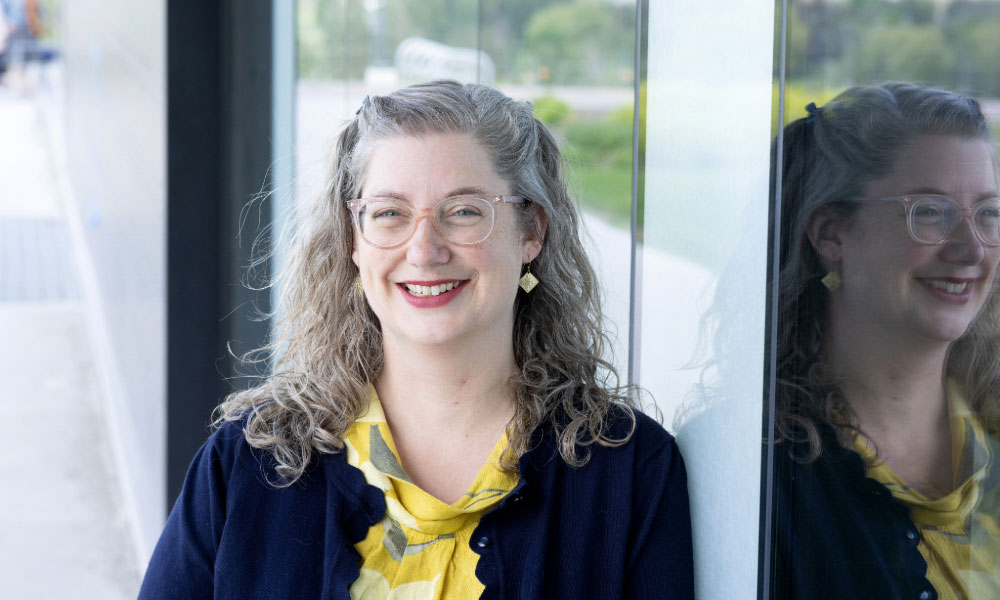“Knowledge dissemination, making connections, and research about communities and within communities is at the heart of everything we do at ICER.”

Dr. Christine Schreyer, Director, Institute for Community Engaged Research (ICER).
Dr. Christine Schreyer has devoted both her academic and professional life to community-based research.
Beginning with her Master’s research in partnership with the Chapleau Cree First Nation, and continuing with her PhD research with the Taku River Tlingit and Loon River Cree First Nations, Dr. Schreyer, an Associate Professor in Anthropology at the University of British Columbia Okanagan campus, has been conducting community research as a settler ally scholar for more than 25 years.
It’s work she hopes to continue in conjunction with other UBC research experts in her new role as Director of the Institute for Community Engaged Research (ICER), a longstanding research institute at UBC Okanagan and an interdisciplinary hub for community-engaged and community-based research.
Having taken on the role this summer, Dr. Schreyer plans to build on the great work happening at the institute, developing strategic partnerships and connections throughout British Columbia and around the globe.
Though the role may be new, Dr. Schreyer is already intimately familiar with ICER.
“I’m lucky because, in a way, I’m able to hit the ground running,” she says. “Having supported the institute as interim director in the past, and having worked with ICER since its inception nine years ago, I’m in a unique position within our established team to jump in quickly and keep the momentum going.”
Pulling from a broad range of disciplinary backgrounds, including anthropology, gender studies, Indigenous studies, economics, education, health studies, human geography, nursing, social work and sociology, the main goal of ICER is to facilitate connections for both research industry projects and communities seeking support through research.
As an example, Dr. Schreyer’s continued research with Papa New Guinea’s Kala speaking communities, work she’s executed with ICER team member and fellow Anthropologist, Dr. John Wagner, has resulted in the development of the language’s writing system, consisting of written characters and the first published dictionary, which was published through ICER Press. To facilitate her work with Kala communities and others, Dr. Schreyer has successfully engaged funding support through the Social Sciences and Humanities Research Council (SSHRC), National Science Foundation (NSF), the National Geographic Genographic Legacy fund, totaling approximately $3.7M.
Looking to the future of ICER, Dr. Schreyer is excited for what’s to come and the upcoming projects the team is planning to undertake. She looks forward to continuing to make ICER a connecting point for researchers looking to do work within communities and working collaboratively within UBC by engaging with institutes and working across both the Okanagan and Vancouver campuses.
As part of that engagement, the ICER team will be launching a podcast in the coming months, featuring tips and best practices for researchers focused on community-based engagement.
“Knowledge dissemination, making connections, and research about communities and within communities is at the heart of everything we do at ICER,” says Dr. Schreyer. “In 2022 we completed a strategic plan where we took feedback from our memberships—we’ll be looking at building a path forward based on this feedback and also continuing to grow the profile and reputation of ICER within UBC and beyond.”
The ICER team is also considering how a symposium might to fit into the institute’s strategy, specifically a symposium on best practices of community-engaged research.
“I’m interested in the idea of putting together a grant that brings people doing community-engaged research together, from all areas of the world, and gives them an opportunity to talk about how they’re doing it,” says Dr. Schreyer. “Learning and growing together in our unique community research with a larger global perspective.”
A 2024 recipient of the Killam Teaching Prize, an award for teaching excellence and innovation, Dr. Schreyer plans to pull from her experiences in teaching and mentoring to help inform her work as director of ICER.
She says she is grateful to those who came before her.
“I can’t take this position without recognizing the leadership before me, and also the amazing support of our institute coordinator, Joanne Carey, who’s been with ICER from the very beginning.”
Connect with Dr. Christine Schreyer and the ICER team if you’re interested in learning more about knowledge mobilization or community engaged research. The ICER team is well positioned to facilitate research partnerships and help you get started with your community-based research project.
ABOUT ICER:
ICER is a hub for building relationships, collaboration, and effective knowledge creation and exchange through research clusters operating across disciplinary and institutional boundaries. ICER operates fluidly in response to and in recognition of changing social issues and facilitates the participation of community members, organizations, students, and academics as co-researchers.
UBC OKANAGAN RESEARCH INSTITUTES:
UBC Okanagan is home to six research institutes, setting the highest standards in interdisciplinary research: Analytics in Medical Science (AiMS) Institute, Canadian Institute for Inclusion and Citizenship (CIIC), Institute for Community Engaged Research (ICER), Institute for Healthy Living and Chronic Disease Prevention (IHLCDP), Materials and Manufacturing Research Institute (MMRI), and the Okanagan Institute for Biodiversity, Resilience and Ecosystems Services (BRAES).